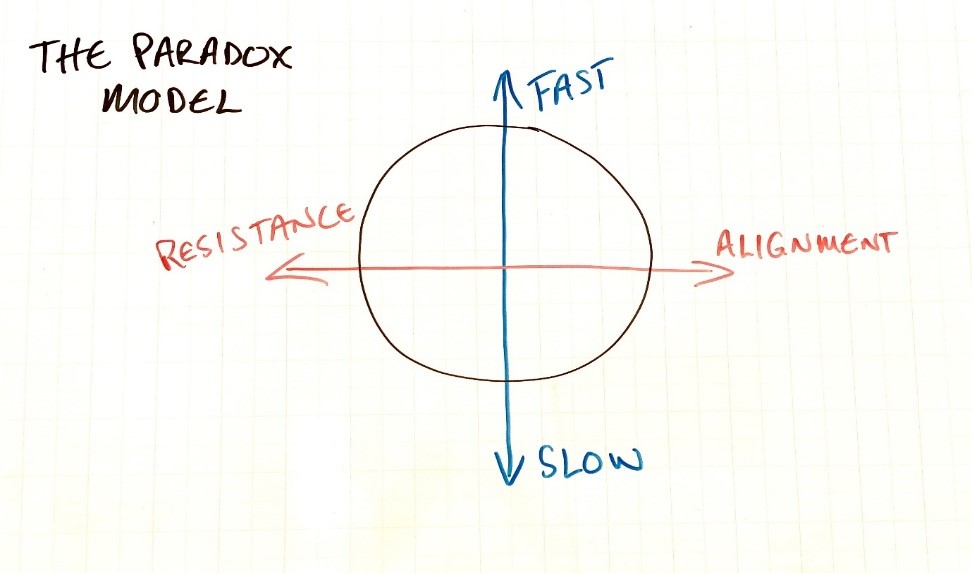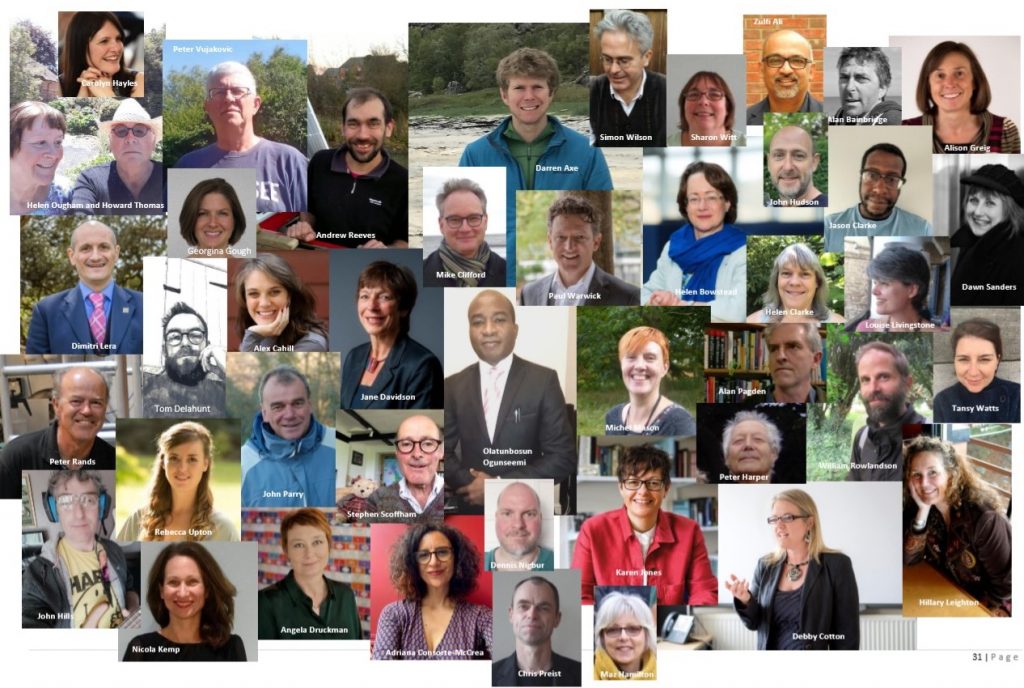This case study presents an innovative approach to organising a conference in digital format. This was led by Dr Adriana Consorte-McCrea, Education for Sustainability Lead, Sustainability Development adriana.consorte-mccrea@canterbury.ac.uk, and colleagues in the sustainability team (Nicola Kemp, Stephen Scoffham, Peter Rands, John Hills, Maz Hamilton)
The Conference “The fierce urgency of now: Navigating paradoxes in sustainability education” took place in May 2020 using the Blackboard Collaborate Ultra platform. In view of the challenges and opportunities of our times, and after a great deal of consultation, we created an online programme, free to access for staff and students from varied institutions across the globe, with the aim to promote discussion of sustainability in higher education and to cultivate a community of practice. Sessions were framed using a Paradox model that provides a framework to plot sustainability education initiatives against two axes: fast/slow; alignment/resistance. These correspond to two major challenges: addressing the urgent global crisis using the “the slow way[s]…” of education (Biesta, 2013:3), and navigating structural and systemic boundaries and resisting “dominant ideologies” driving professional practice (Barnett, 2018:1).

Nature of the innovative activity:
The Conference was envisaged in 2019 as a two days event taking place in May 2020. When in April we were faced with the limitations posed by the coronavirus pandemic, we decided to make the conference an online event. We decided to use Blackboard Collaborate Ultra as it could accommodate pre-recording presentations as well as live events allowing over 100 participants to attend. It also allowed events to be recorded and recordings to be stored and made available to participants indefinitely. Nearly 150 delegates from the UK, Sweden, Canada, Nigeria, China and Malaysia registered to attend.

The online conference offered:
- Pre-recorded presentations: 15-minute presentations were made available via link included in a conference programme five days before live Q&As, remaining available to watch after the conference ended. An opening address and 33 presentations (grouped into four quadrants according to the Paradox model) were recorded.
- Live online sessions. These were recorded and made available after the conference:
- Two online welcome rooms (15 minutes each): open just before the first live session of the day, to allow participants to familiarise themselves with the platform, test video and sound and to troubleshoot;
- Four Q&As (60 minutes each): one session for each quadrant defined by the Paradox model. Participants were encouraged to watch as many pre-recorded presentations as they wished and to send any questions to session chairs before the Q&As; during Q&As participants could write questions to paper presenters and make comments using ‘chat’;
- Chat rooms: available after each live Q&A so allow participants to continue the conversation;
- Two Workshops (60 minutes each): interactive resources such as break-out rooms and whiteboards were used by leads to facilitate collaboration between participants;
- Panel discussion (75 minutes): Chairs from each quadrant session brought together key ideas gathered along the conference, with participants contributing via ‘chat’.
- A comprehensive Programme was sent to participants in advance of the live sessions, including a timetable of events with links to live sessions, background information and expected outcomes, guidance for attendees and presenters on best practice for best online experience, contacts of organisers and technical support, pre-recorded presentations and links to watch these by quadrant, social media and networking links, and abstracts.
- A 15 minute break was scheduled between sessions to give participants breathing time.
- Social Media: we set up Twitter (#cccushe2020) and a Facebook dedicated group at https://www.facebook.com/groups/cccushe2020/.
Evaluation:
Participants were very positive all the way through and after the conference, expressing gratitude and recognition for the work involved in making it happen successfully. To gather structured feedback, an online questionnaire was sent, resulting in a 36% response rate. The aim was to find out how the diverse elements of the experience were perceived by participants, identify successes, areas for improvement, and new ideas for future events.
Based on the responses, participants found the pdf programme very useful, and sessions easy to access. They were happy with the communication, organization and support offered, though some found the pre-recording process frustrating.
“It was my first and a great experience. Maybe I was a bit nervous and taken back by the level of dialogue.”
“Excellent to have tech support and quick responses. Friendly quick responses from academic team also.”
Respondents found pre-recorded presentations very easy to access and to watch and were happy with their duration. However, they noted that the audio/visual quality of recordings varied greatly. The success of the recording process depends on browser accessibility and internet connection, and to how familiar/comfortable presenters are with the technology, to be considered in online events.
Participants were also happy with the accessibility of live events, and most found it easy to take part. They were particularly happy with the opportunity to ask and answer questions, and the possibility of watching recorded discussion later. Many respondents enjoyed the social aspects of live sessions and found that ‘chat rooms’ were good for making connections for further collaboration. However, most respondents did not use ‘chat rooms’. Although most respondents enjoyed using the ‘Chat’ function to interact with all participants, some had difficulties with its dynamic nature (keeping up with chats and responding quickly). Slido was suggested as an alternative for effective interaction, to be considered in the future. Since there was not enough time to reply to all questions sent by email and chat, a post-conference proceedings pdf included the contacts for all presenters, facilitating direct interactions.
Live workshops were well attended, and were successful in promoting interaction, group work and participation, addressing a need for social inclusivity. Comments suggest attendees would like even more interactivity, including the use of polls.
“ (The workshop)’Coming back to life’ was soothing, uplifting and inspiring. I managed to feel like I was part of something rather than stuck at home alone.”
“Interactive, it gave a real sense of participating, creating together, experiencing what was proposed, being heard.”
Interestingly the social media platforms offered were not popular, and when asked suggestions for improvements, respondents demonstrated lack of interest for such form of engagement.
Overall, the conference exceeded respondents’ expectations and according to them, beyond being more interactive than expected, it promoted understanding of issues and of a need for change through interesting presentations, with diversity of voices and views and practical applications. It also provided opportunities for professional development, new contacts and connectivity. There were also suggestions that it helped increase motivation, optimism and reassurance on their own practice, and provided encouragement to overcome barriers and rethink priorities, as well as an understanding that online conferences are possible!
“How connected we all are, how many like-minded colleagues there are and how I would have liked to be in person to share a beverage and a longer chat with so many as we imagine our new way forward – I am so grateful for the conference organizers – well done!”
“The format allowed much more discussion and insight into other delegate’s thoughts than a standard conference”.
The online conference was also considered a good option to avoid costs of traveling long distances and promoting inclusion.
Outcomes:
- Conference Proceedings, including links to watch all sessions on ReCap, abstracts, contact details for all presenters and guidance for submitting a paper to the IJSHE Special Issue (see below).
- Recordings (on ReCap) continue to be watched by attendees of the Conference, with viewings reaching 500 + views.
- Special Issue of the International Journal of Sustainability in Higher Education. Presenters were invited to submit their manuscripts to the IJSHE https://www.emeraldgrouppublishing.com/ijshe.htm for the special issue “Navigating Paradoxes in Sustainability Education”, to be published in March 2021.
- Sustainability Discussion Group
After the conference, participants have been invited to lead 60 minutes online discussions, free and open to all attendees and CCCU community. These events have been very successful and well attended, and more are planned to follow.
- Diversity and Inclusion in Sustainability working group
One of the messages from the conference was the importance of promoting diverse voices and discourses in education for sustainability. The online vehicle using pre-recorded presentations could help promote inclusion. As suggested by delegates we may achieve more diversity and inclusion by wider/borderless publicity advertised globally; conference hosted by institution outside Europe and North America (considering time differences); embedding universal and accessible design into all aspects, increasing representation from ethnic minorities within organisational roles, and reaching out to minority groups and BAME networks within universities.
“ (We may) actively invite keynotes and presenters who represent diverse communities and make it more accessible and welcoming to ‘international’ students”.
This statement from a delegate also highlights the need for a wider student audience, which may be addressed by invitation of students’ reps from all universities and by keeping the event free or subsidised for students. To discuss and address such issues a Diversity and Inclusion in Sustainability working group has been formed within CCCUs’ Sustainability Development following the Conference.
References:
Barnett, R., 2018. The Ecological University: A feasible utopia. Routledge 214pp.
Biesta, G. 2013. The Beautiful Risk of Education. Taylor & Francis 164pp.
 PRISM
PRISM Jack Charter
Jack Charter 4497
4497


